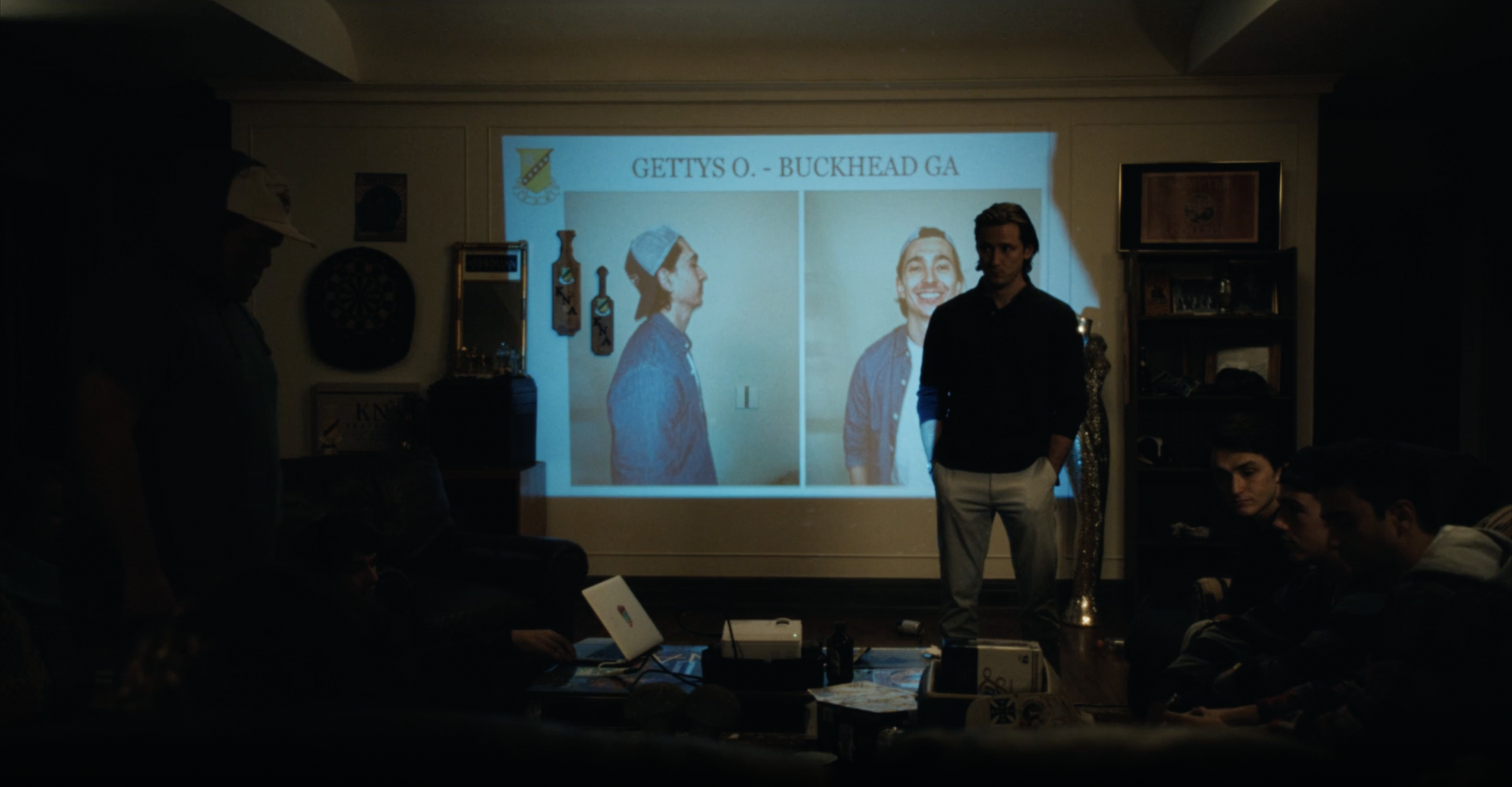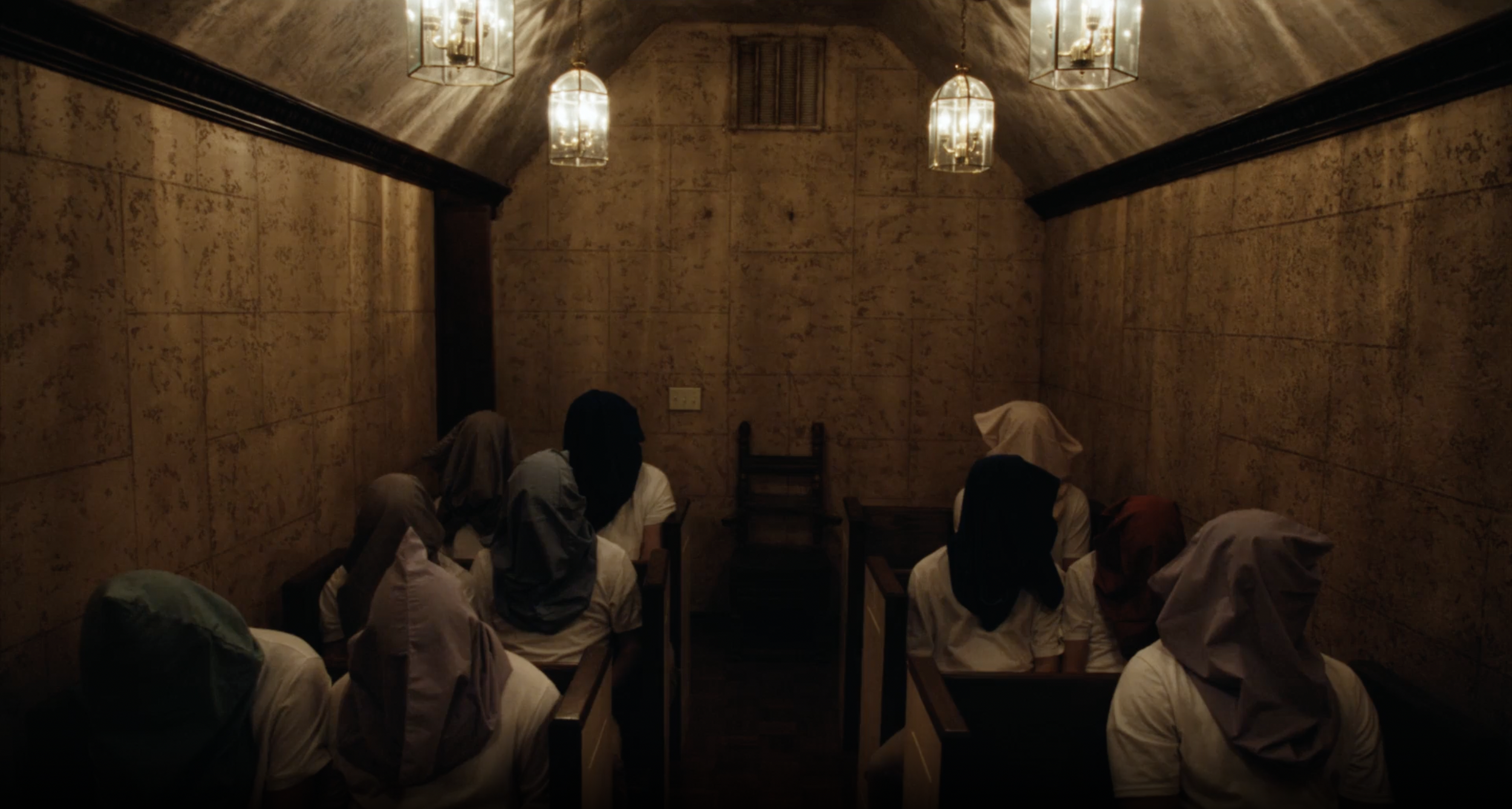“The Line” - Film Review
The year is 2014. The Winter Olympics are taking place in Sochi, Russia, Malaysia Airlines Flight 370 has gone missing, the Ebola outbreak is declared a public health emergency, and One World Trade Center officially opens in New York City. None of these large events mean anything at all to the boys of KNA fraternity in Ethan Berger’s The Line. They only care about girls, beer, drugs, and partying. Their worldview doesn’t extend beyond the yard of their fraternity house, and for them, that’s paradise. As Berger’s film unfolds, he puts a microscope to the culture of Greek life on campus. 2014 may be a decade in the past, but the realities of frat life that are on full, ugly display in The Line have not changed.
Courtesy of Utopia
Tom (Alex Wolff) is counting down the days to his return to Sumpter for his sophomore year of college. He spent the summer at home with his mom (Cheri Oteri), working at a restaurant and lamenting that he’s the only one of his fraternity brothers who has to work at a minimum wage job like that. Tom isn’t excited to return to college for learning, but he’s thrilled because he finally gets to live in his fraternity’s house. KNA has been home to presidents, Fortune 500 CEOs, and men who are now in positions of power. Frat president Todd (Lewis Pullman) instills in his brothers that they are not only setting the pace for the university, but for all of America. Whether or not that’s true remains to be seen, but it immediately shows the audience the sense of self-important grandeur these boys have created for themselves. The Line takes place during Rush when new, potential members undergo hazing in order to be accepted into KNA.
If you’ve spent any time at a large public university in the United States, you’ve come in contact with a fraternity or a sorority. In theory, these organizations are philanthropic. It’s rhetoric they fall back on when colleges take issue with their presence on campus. Frats and sororities claim they allow like-minded students to come together so they can find lifelong friends, serve the community, and create a bond that connects them to fellow organization members around the country. Of course, to be included in one of these groups comes with a price tag. The promise of friendship and brother/sisterhood costs hundreds, if not thousands, of dollars a semester.
Courtesy of Utopia
Without being in one of these groups, it’s kind of difficult to see the appeal of paying exorbitant amounts of money to find a group of people to hang out with. However, The Line does an excellent job of showing what entices young people to endure the suffering of hazing. That’s what humans, at their very core, crave. The desire to belong, to have community, and to be a part of something far larger than themselves. Fraternities in particular feel like a safe place for men to be physical and intimate with each other in a way that goes against what society expects of them. It’s not necessarily sexual, but fraternities give boys the freedom to care deeply about other men and build their lives around friendships. Of course, the flipside of that coin is that fraternities are a breeding ground for violence.
While it’s true that frats can encourage friendships that are meaningful, these relationships are built on extraordinarily shaky ground. The Line shows that even if companionship amongst these boys develops, it often comes after horrible abuse. The hazing that pledges endure is violent, humiliating, and degrading. Those who make it through then continue the cycle of abuse by inflicting that same violence onto the new group of pledges. By forming relationships in this way, these boys are being taught that all relationships should be formed this way. Fraternities, for all their good intentions of community, are churning out young men with over-inflated senses of entitlement, violent anger, and toxic masculinity.
Courtesy of Utopia
Tom has fully bought into the ideology of fraternities. He’s not from a wealthy background, nor is he from the rich suburbs his brothers grew up in. He essentially puts on a performance of a frat member with his khaki pants, preppy button-ups, and fake Forrest Gump accent. Tom’s world is knocked off its axis when he meets Annabelle (Halle Bailey), a very liberal student in his literature class. At first, her character feels frustrating because far too often we’ve seen female characters reduced to the sole function of bettering their male love interest. In The Line, that’s kind of the role that Annabelle plays. After she and Tom talk after class a few times, they hook up, but that’s it. To her, Tom is a classmate she sometimes hooks up with, and nothing more. To Tom, Annabelle is something he’s never experienced before, simply because she listens to him and asks questions. It’s something that no one in the frat house is doing, so he has a conflated sense of the importance of the relationship. In another version of this movie, Annabelle would be entirely devoted to Tom, even though she barely knows the guy. The Line uses this type of stereotypical female character and flips it on its head for a smart reversal of a tired trope.
You could say that fraternities are examples of the Stanford Prison Experiment playing out across the United States every fall. The incoming pledges are the prisoners and the upperclassmen are the guards. Unlike the experiment, there is seemingly no end in sight for Greek life violence. The Line is a nasty little human horror nightmare told in a vividly naturalistic style that allows the intensity of the brothers’ actions sink in. The film plays with the idea of blind faith, devotion, and the way violence is used as a tool to keep believers in line. The Line is not a movie that will quickly be forgotten, nor should it be.
support your local film critic!
~
support your local film critic! ~
Beyond the Cinerama Dome is run by one perpetually tired film critic
and her anxious emotional support chihuahua named Frankie.
Your kind donation means Frankie doesn’t need to get a job…yet.
Follow me on BlueSky, Instagram, Letterboxd, & YouTube. Check out Movies with My Dad, a new podcast recorded on the car ride home from the movies.



